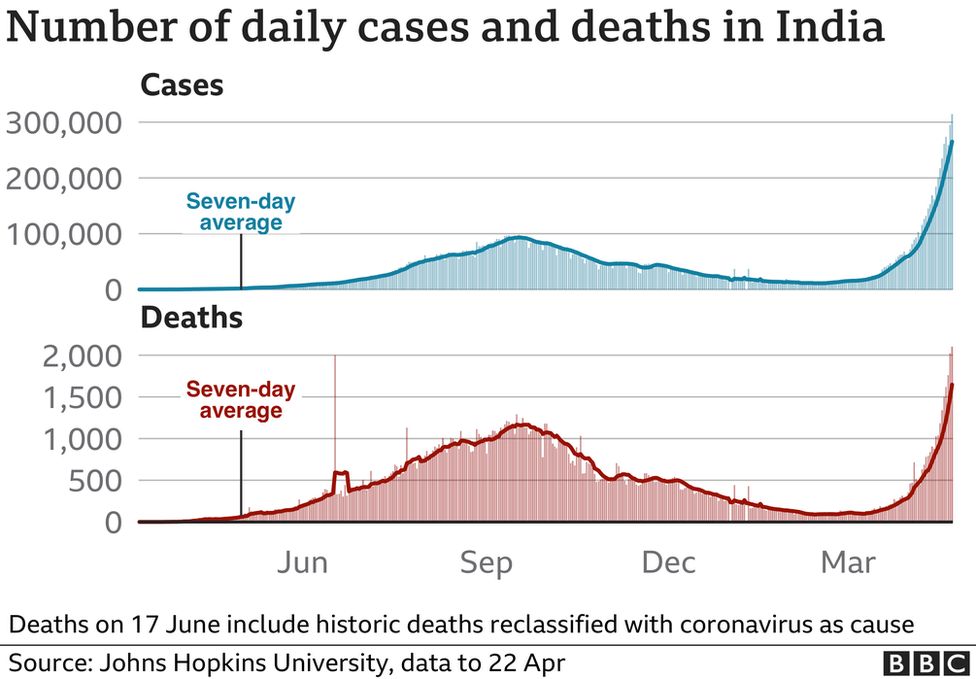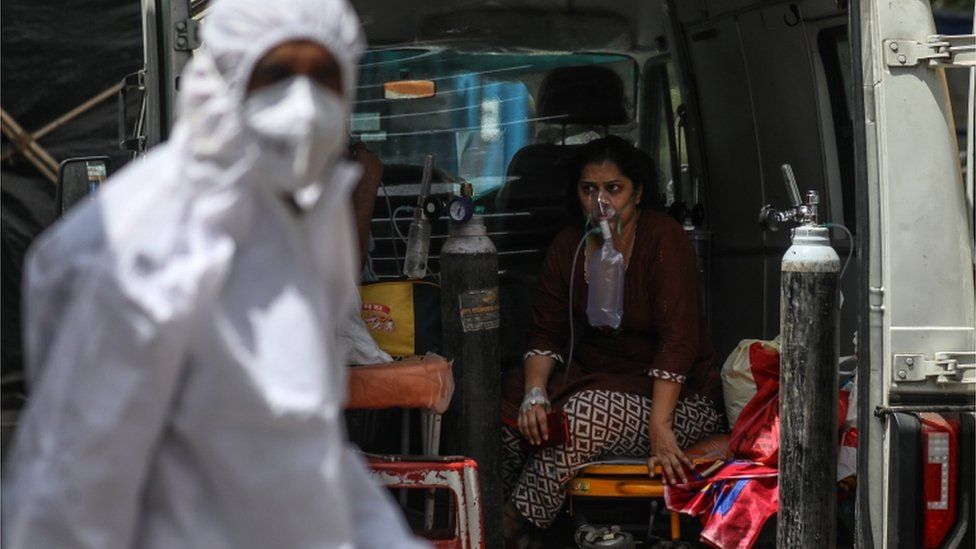India has recorded the highest one-day tally of new Covid-19 cases anywhere in the world - and the country's highest number of deaths over 24 hours.
It has close to 16 million confirmed cases, second only to the US.
The country is in the grip of a second wave, raising more fears about its overwhelmed health care system.
Crowds have formed outside hospitals in major cities which are filled to capacity. A number of people have died while waiting for oxygen.
Meanwhile, some countries are bringing in stricter rules affecting travel to and from India amid fears over the rising cases.
Australia's Prime Minister Scott Morrison said the number of flights between the two countries would be cut, while the UK has added India to a red list, restricting travel and bringing in hotel quarantine for all arrivals from India from Friday morning.
What's happening in India's hospitals?
India is struggling to cope with the soaring numbers - it recorded some 314,835 new coronavirus cases in the last 24 hours, while deaths rose by 2,104.
Oxygen supply has been a particular problem, with a number of hospitals in the capital Delhi running out entirely on Thursday, according to the city's Deputy Chief Minister, Manish Sisodia.

Delhi's highest court on Wednesday publicly criticised the central government for its handling of the oxygen crisis in the city.
"This is ridiculous. We want to know what the centre is doing with regard to oxygen supply across India," the judges said while reading out the verdict in a petition by the owner of six private hospitals.
It ordered the government to ensure safe passage of oxygen supplies from factories to hospitals across India. Delhi state government approached the high court again on Thursday when two of the city's hospitals reported they had only a few hours' oxygen supply left.
The court ordered the federal government, which allocates oxygen quota to states, to ensure smooth supply of to Delhi. The federal government said it was ensuring free movement of oxygen tankers between states.

A feeling of helplessness
By Vikas Pandey, BBC News, Delhi
My phone is constantly ringing with desperate friends and family asking for help to arrange beds and medicine. Some I am able to help, and some I can't.
I personally know of many cases where patients died because they couldn't get oxygen in time. It's heart-breaking for families to hear that the hospital where their loved ones are being treated may soon run out of oxygen.
Emergency intervention from the government has stopped any big disaster from happening so far, but there is an urgent need to give hospitals enough oxygen so they can sustain the increasing caseload.
But experts are asking why the government allowed the situation to become so dire. The pandemic was under control in January but the lean period was not used to augment healthcare facilities.
And now people are paying a heavy price for it, and we are left with a sense of helplessness all around.

How is India trying to contain cases?
Unlike last year, no national lockdown has been announced. Instead, regions are implementing their own rules.
Delhi announced a week-long lockdown at the weekend, leaving just government offices and essential services like hospitals, pharmacies and grocers open.
The authorities in the worst affected state of Maharashtra - which was already under a partial lockdown - have announced a series of additional restrictions starting from Thursday evening.
Maharashtra is India's richest state and home to its financial hub, Mumbai. It has also been a Covid hotspot since the start of the pandemic, accounting for a quarter of India's cases.

Maharashtra has also reported more deaths from the virus than any other state, with 67,468. India has suffered nearly 185,000 deaths with Covid, according to Johns Hopkins University. However, while deaths have been rising, the fatality rate remains relatively low.
Uttar Pradesh, which is also reporting a high caseload, has adopted a more conservative approach, with its high court on Monday ordering a lockdown in five badly affected districts. However, it was put on hold after the government appealed against the decision in Supreme Court.
How is India's vaccination drive going?
India - which has a population of more than a billion people - has so far administered more than 130 million doses but the drive has been restricted to health workers, frontline staff, those above the age of 45 and anyone with comorbidities.
From 1 May, people above 18 will also be eligible for the vaccine. But a supply crunch, which is already affecting the drive, could slow it down further.
On Thursday, Pfizer announced it was in ongoing discussions with the Indian government to supply its Covid-19 vaccine to the country at a not-for-profit price.
What caused the latest wave?
India has seen a rapid rise in case numbers over the past month driven by lax safety protocols, a Hindu festival attended by millions and variants of the virus, including a "double mutant" strain. It was detected in 61% of samples tested in Maharashtra, according to the National Institute of Virology.
Huge election rallies - including by Prime Minister Narendra Modi - were also not halted in the state of West Bengal which has been holding elections in phases in recent weeks.
Voters will be casting ballots on Thursday as well, for the sixth stage of voting. The government has defended the decision to continue with the polling.

Are you affected by Covid-19 in India? Please share your story by emailing haveyoursay@bbc.co.uk.
Please include a contact number if you are willing to speak to a BBC journalist. You can also get in touch in the following ways:
- WhatsApp: +44 7756 165803
- Tweet: @BBC_HaveYourSay
- Please read our terms & conditions and privacy policy
If you are reading this page and can't see the form you will need to visit the mobile version of the BBC website to submit your question or comment or you can email us at HaveYourSay@bbc.co.uk. Please include your name, age and location with any submission.
"world" - Google News
April 22, 2021 at 05:49PM
https://ift.tt/3eqx8xd
Covid: India sees world's highest daily cases amid oxygen shortage - BBC News
"world" - Google News
https://ift.tt/3d80zBJ
https://ift.tt/2WkdbyX
Bagikan Berita Ini














0 Response to "Covid: India sees world's highest daily cases amid oxygen shortage - BBC News"
Post a Comment